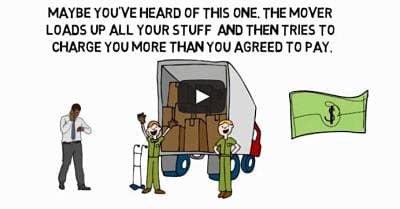Moving is already stressful enough. It’s even worse if you end up dealing with an unqualified mover that tries to scam you.
Maybe you’ve heard of this one. The mover loads up all your stuff – and then tries to charge you more than you agreed to pay. You pay it because you want to protect your stuff.
Or, your mover gives you a date for delivery and tries to change it once your belongings are loaded. Again, you’re at the mercy of the mover because they have possession of your belongings.
You can avoid these and other scams by preparing yourself for your move. These tips will provide you the information you need to make a smart move.
How to Make a Smart Move
-
- Talk to friends who have recently moved: If you know anyone who has relocated in the last year or so ask them how it went and which mover did the job. If they had a good experience contact the mover for an estimate. If they had a bad experience, you’ll be able to cross that moving company off your list.
-
- Ask your realtor for a recommendation: Realtors should know movers with a good and bad reputation. Some will even have a list of preferred vendors, but you still need to do your due diligence as some real estate professionals have financial arrangements with the preferred movers that influence their advice.
-
- Do your homework: There’s no substitute for doing your own research. You can find tons of consumer information, reviews and even warnings on the Internet. You can also tell a lot about a mover by visiting its website. Make sure the company has a professional approach, a physical address and a customer service contact in case of a problem.
-
- Set up in-home estimates: The more information you give the mover, the more precise the estimate it can give you. It’s always a good idea to get three or more in-home estimates. This gives you the opportunity to meet the company’s workers and see how they deal with customers. Also, make sure offer is accurate — not based on the company underestimating the weight of your load to get your business. This “bait and switch” scam can lead to a higher price when the move actually happens. By getting multiple estimates, you’ll get an idea of the going rate.
-
- Get it in Writing: Get a rock solid estimate or contract in writing that is detailed and covers everything. Don’t settle for a mover that says the details aren’t important and only talks about pounds, price, and distance. You need to know specifics about the issues that could cause your moving costs to go up. Also, never do a cash deal to save money. You’ll have no way to prove anything if the move goes badly or your property is damaged or stolen.
-
- Avoid upfront payments: The more you pay before the move; the less incentive the company has to provide you with a great move. Find a company that has a reasonable deposit, but takes most of the payment once the move is completed to your satisfaction. In addition, make sure your deposit is refundable if you decide to go another route.
-
- Check out the mover’s equipment and workers: Old trucks and unqualified workers can lead to a frustrating move. Don’t be afraid to ask the company to provide proof of employee background checks and drug testing policies. The movers will handle some of your most prized possessions and you need to make sure they have qualified workers.
-
- Find out what to do if something goes wrong: Even if you use a quality mover, things can go wrong. Find out how you can file a claim if your stuff is damaged or stolen during the move. Different states require moving companies to reimburse varying amounts based on the weight of items that get damaged. Find out if you will be dealing with the company or a third party, like an insurance company, if a mishap occurs.
-
- Check licensing: The Federal Motor Carrier Safety Administration licenses interstate movers. Visit www.protectyourmove.gov to learn how to screen the companies. In addition, the site provides resources for checking the licensing of in-state movers.
Remember, scammers play on your ignorance and the best way to avoid a scam is to educate yourself. Following these tips can help you reduce the stress of unplanned expenses and the frustration of a low-quality move.

